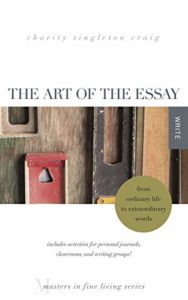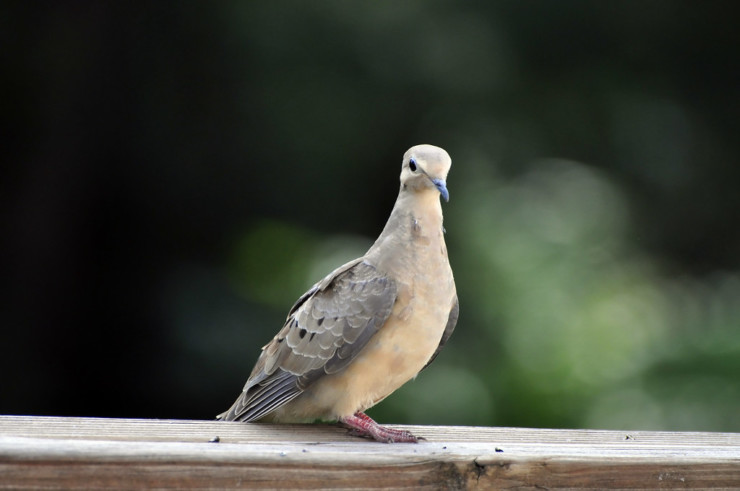Writers read a lot of books on writing. I’ve learned that books on writing fall into three loose groups. One group, by far the largest, focuses on the craft, similar to lectures by English composition teachers. A second group is by authors who’ve worked very hard to sound wise and profound; I call this group the self-recognized oracles. And the third and smallest group is by authors who genuinely want to help other writers because they love writing and they know how hard it can be.
Most writers of books in that second group will claim their work is actually in the third group. I call that self-deception of self-recognized oracles.
The Art of the Essay: From Ordinary Life to Extraordinary Words by Charity Singleton Craig falls squarely, and without pretense, in that third group. This is a narrative that’s written to me as a writer from a writer who loves what she does and wants other writers to love what they do. She knows that many times you are writing for an audience of one, yourself, and you do it because you love the rhythm, flow, and beauty of arranging words. And you do it because you simply need to do it.

Craig gets specific about what writing she likes to do. “I am an essayist,” she says. “You might be, too.” And then she tells you why, what you can do about it, and where you can go looking to practice it.
The Art of the Essay is not a recipe book for how to write an essay—what an essay is, what its discrete parts are, a list of do’s and don’ts, or “Here are the rules to follow and break when necessary.” Instead, Craig tells stories, about listening to the whispers of the everyday; when memory is less than reliable; asking questions; making maps; the centering of place; your family and what they might think of starring in an article; finding the humor in life; and more. She doesn’t neglect the tools of writing an essay; she embeds them in the stories she tells. We learn about inspiration, revising and editing, conclusions, examples, evidence, and submission to publishers. But we learn them indirectly, and more effectively, from the stories.
My favorite chapter is the final one, “Writing What Matters.” Discussing the great questions of the day, engaging in debate, seeking resolution and consensus are becoming forgotten in our contemporary culture. Instead, propelled by social media, we fall into the “gotcha” moments, the snark, the verbal powers to emerge triumphant. An essay is not about triumphing over your perceived enemies; you have Twitter for that. Craig says an essay can be, and should be, genuine conversation that creates community.
The book includes an appendix for individual and group activities, aligned with each chapter; guidelines for peer review and group critique; and a list of potential markets.
Craig received a degree in mass communications from Taylor University. She is the author of My Year in Words (2016) and the coauthor of On Being a Writer: 12 Simple Habits for a Writing Life that Lasts (2014) with Ann Kroeker. She’s also contributed essays to three books, including The Wonder Years: 40 Women over 40 on Aging, Faith, Beauty, and Strength (2018) and Letters to Me: Conversations with a Younger Self (2012), and is a regular contributor for a number of magazines and journals such as Edible Indy. She lives in Indiana and is a two-time recipient of the Arts in the Parks and Historic Sites Grant from the Indiana Arts Commission and the Indiana Department of Natural Resources, to write about the state parks and present writing programs to park visitors.
The Art of the Essay conveys a love for writing. It speaks to our heads, but it speaks to our hearts even more. It’s about being a better writer, and understanding why that’s important.
Photo by likeaduck, Creative Commons, via Flickr. Post by Glynn Young.
__________________________

“I require all our incoming poetry students—in the MFA I direct—to buy and read this book.”
—Jeanetta Calhoun Mish
- Poets and Poems: Sandra Marchetti and “Diorama” - April 24, 2025
- Poets and Poems: Christina Cook and “Roaming the Labyrinth” - April 22, 2025
- Longfellow’s “Paul Revere’s Ride”: Creating a National Legend - April 17, 2025


L.L. Barkat says
I’m so glad you said that about the final chapter. I felt that it alone was worth the price of the book. Charity’s discussion of “why write” made me remember why being a writer is such a great vocation—and by great, I mean the more formal Great. It’s an honor and a privilege to work with words, to sustain and shape (and reshape) the world.
Charity Singleton Craig says
Glynn — Thank you so much for these gracious words. You made ME want to read this book! 🙂
That last chapter is probably the one that matters most to me, too, as a writer and a reader. I think it’s the way we keep our stories and our words from becoming too precious to us or too narrow a gate for others to walk through.
Now that I think about it, I think your work is a perfect example of Writing What Matters. You’re always conversing with other voices, other ideas — always using the language and context of the conversation going on around you. I’ll be pointing to you when readers ask me what it looks like to write what matters.
Thanks again, Glynn!